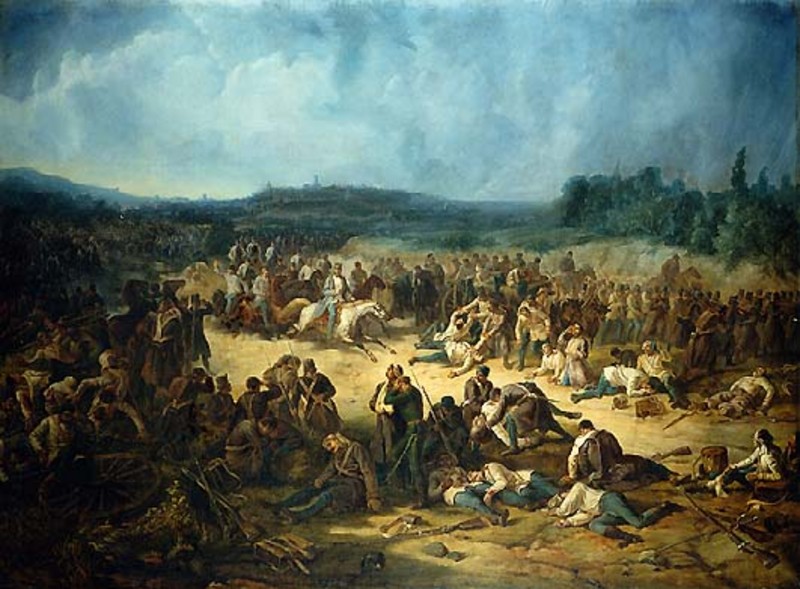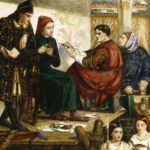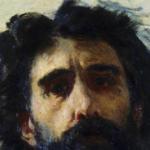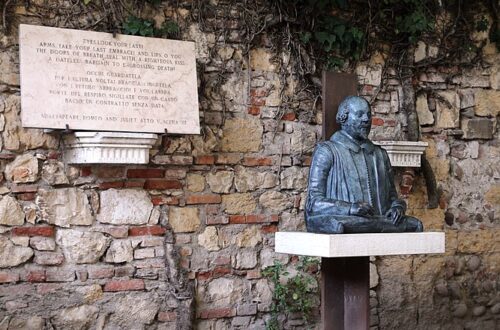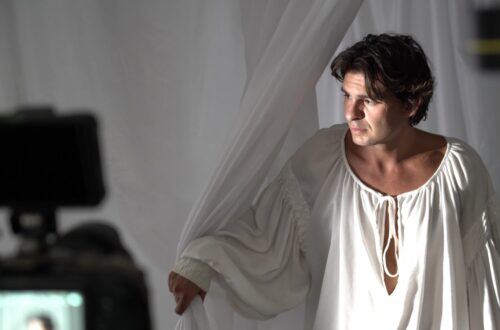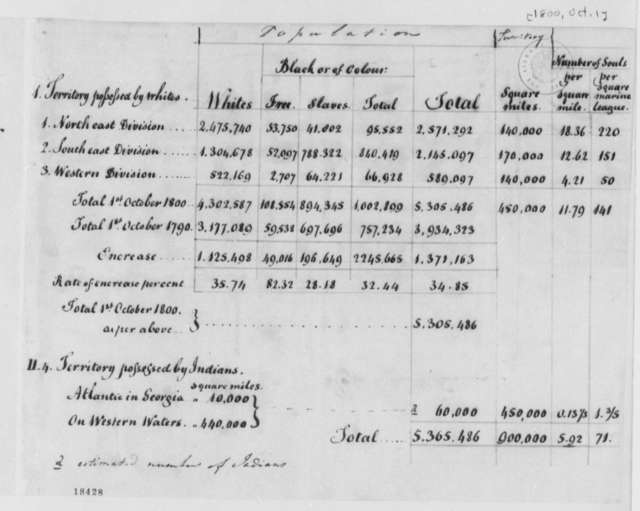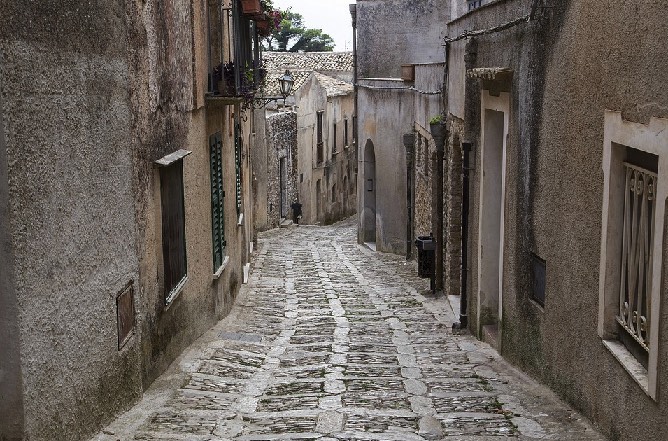
Don Paolo: the Making and Unmaking of a Dragon (Il Drago Part 3)
In this third instalment of Il Drago by Luigi Capuana we learn how Don Paolo became “Dragone”. Who is this fearsome old man who chased the children away when they begged in the streets? And took them in, in what all said was a miracle? And how was it that the Dragone was unmade?
The Making and Unmaking of Don Paolo Dragone
by Luigi Capuana (translation: Michael Curtotti)
It had been years and years that the Dragon had lived alone in his tenement, doing all for himself. Two large rooms on the ground floor, and four smoky rooms on the first floor. For one person it would have been more than ample, but the ground floor also served as animal pen, hay store, grain silo, wine cellar, and repository for all things else. Nor was the upper floor any less cluttered with its dusty cobweb covered objects: folded up mattresses, bed covers piled on tables, bed slats stacked against walls; all were found there. Three legged iron wire racks held mounded fabrics, neither of whose colours nor whose function could be discerned. The walls were covered with time faded pictures, prints of various dimensions, monochrome and colour, of saints rendered unrecognisable by smoke fumes. Between them were corbelled shelves crowded with flagons, bottles, flasks, vials, cups, coffee makers, graters, and indeed with various kinds of tools all rendered unusable by rust and stored away there together, ever since, in less than the space of three months, his wife and two daughters had died.
Of the rooms upstairs only the bedroom and the kitchen were a little more in order. He lived there in isolation. Almost as if the other rooms were not his, not permitting any living soul to penetrate therein, himself only emerging rarely, except to go to his fields, or to mass on Sunday morning.
The only beings that lived with him in that squalid place were his donkey and a cat: the donkey, old and balding, its ears drooping and eyes rheumatic; and the cat equally aged and hairless, who, when it was not found meowing weakly as it slowly wandering the rooms, was to be found purring on a little seat, or on a pile of mattresses or fabrics.
Don Paolo had endured that bitter life for more than 30 years, becoming more and more severe, more and more gruff, more dragone, as his neighbours said. Now at last, he was reduced to a wrinkled form, beard and hair white, a little bent with age, but more hardy and agile then he seemed to look at. And if someone of his age, met him, they would stop him and ask:
“What are you doing, Don Paolo?”
“I am waiting for death”, he would reply. “What else can I do?”
It was true enough. His house had been emptied in three months: typhoid had taken his wife and little daughters, and he had never recovered from the tragedy. He became misanthrope, dragone, not wanting to see anyone, almost as if his neighbours themselves had killed wife and children. He folded up the mattresses, put away their clothes, packed up the beds of his two dear children, and had thrown everything there in disorder, and had not touched it again for years and years, not worrying whether mice, silverfish, dust or cobwebs had ruined fabrics or mattresses.
What were they good for? He didn’t have other relatives, not even on his wife’s side. So, surrounded by all those dead things, he waited for death. And at night, when reciting the rosary, he prayed for those who had left him alone, and begged them to come and take him. But they never came. They had forgotten him.
That year however, little by little, the thought had grown in him that his life would end that autumn.
The signs were plain to see, according to him. He rarely felt pity for the misfortunes of others. Almost he was angry and ashamed. Did they then have pity or compassion for him?
They called him Il Drago, and he would be dragon until his last breath.
Setting himself at his window to smoke his old clay pipe, he had noted the two orphan girls, who had come to live opposite recently, and his heart had begun to soften with memories he had thought long erased.
Was it an illusion of his imagination or was it real? It seemed to him that the two orphans collected by Aunt Witch, Zia Strega, he would not address her otherwise, truly resembled his lost children when they were small. And so, what was it to him? They were not his children. His children were dead, and their bodies had been eaten by worms in the tombs under the Church of the Cappuccini. Why should he bother about these two here?
And yet, from his window, smoking his pipe and without exchanging a word with his neighbours (who did not speak to him either knowing that he would not reply to anyone), he observed the children. He watched them while they played in the street in front of their door. He watched over them protectively, softly tutting, if the Witch mistreated them.
“But why should he bother about them?”
He repeated this to himself to suppress the compassion which he felt rising within him, to his great discomfort.
Then for quite a few days he did not see them anymore. Where had they disappeared? What had that witch done with them? He was troubled: worried all day, looking out more frequently than usual from his window; angered by their absence. He missed something. At least he had had a distraction when he was smoking his pipe.
And the morning that he had found them, while going to his fields, outside the city on the little wall of the bridge, begging for charity, his heart, hardened by misfortune and solitude, had felt a strange agitation; but the first time he had only given them a hard look and had passed on. Two days later he couldn’t help himself. In the evening when he had returned from his fields it had been a great struggle for him to confront that witch, their aunt. He had found her seated on her front doorstep with the two children laying on the ground on each side of her like two beasts.
He had slept poorly that night, always thinking of those two poor children, muttering curses against the witch who sent them to beg and who wanted to live on their small shoulders, without working. Great Witch! Streggacia!
The next morning, putting the reins on his donkey, he had continued thinking of the two unfortunates, without mother or father, who would undoubtedly already be begging by some wall, notwithstanding that he had argued with the witch on their behalf; and he had prepared a half loaf of bread to give to them to send them home, even while repeating every so often to himself:
“Why should I care? They aren’t my daughters! My daughters are down there in the Church of the Cappuccini. The worms have eaten them!”
Then of a sudden, almost as if a hard core had melted in his heart, that day he couldn’t help himself, and he had chased them in front of him into his house, and slammed his door shut on the faces of the witch and his neighbours.
Notes
The sub-heading does not appear in Luigi Capuana’s original text.
Image
Streetscape – Erice, Sicily
